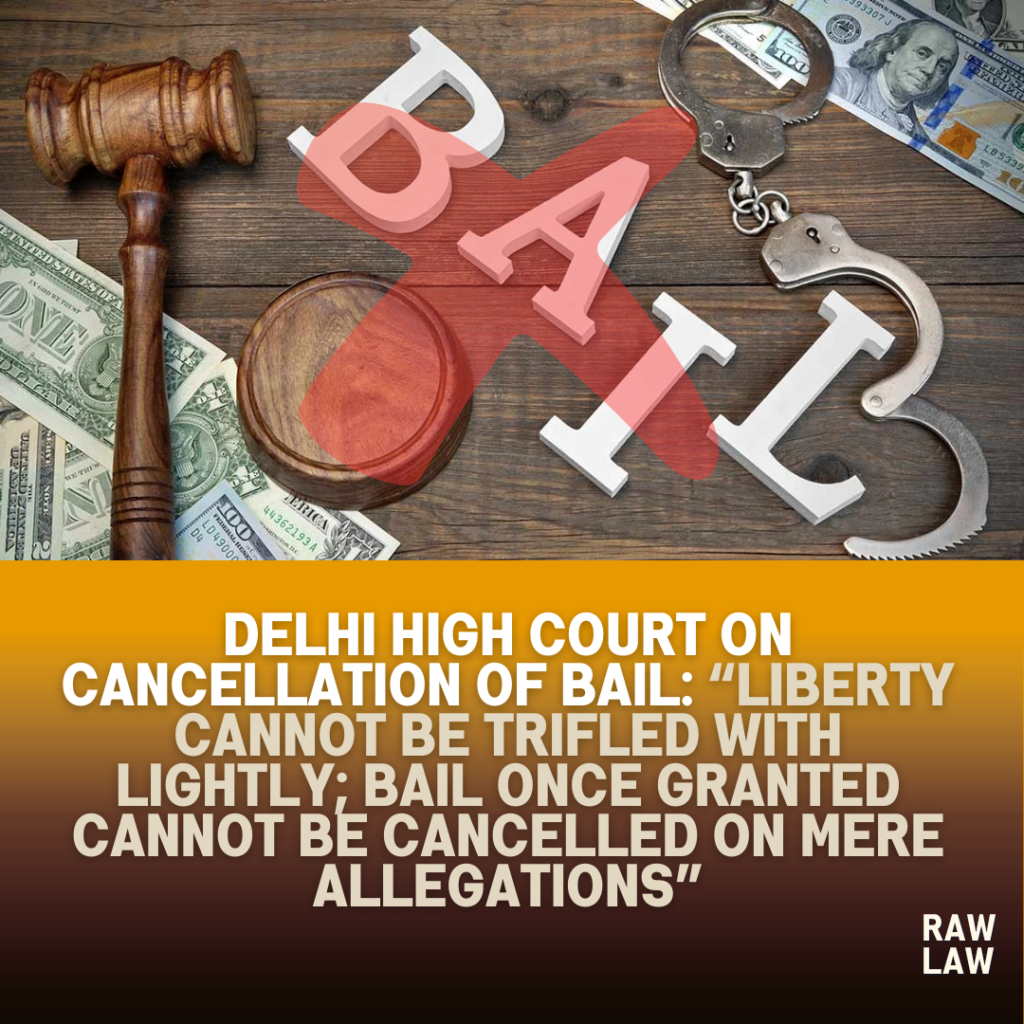Court’s Decision
The Delhi High Court set aside the order of the lower court cancelling the bail of the petitioner, holding that the grounds cited were insufficient and unsupported by material evidence. The Court emphasized that cancellation of bail is an exceptional step, only permissible when cogent circumstances exist such as tampering with evidence, threatening witnesses, or committing another offence. It reiterated that “liberty cannot be trifled with lightly” and that bail once granted should not be interfered with casually.
Facts
The petitioner was granted bail after being arrested in connection with charges under serious penal provisions. Subsequently, the prosecution moved for cancellation of bail alleging that the petitioner attempted to influence witnesses and violated bail conditions. The trial court accepted this plea and cancelled bail. Aggrieved, the petitioner approached the High Court, arguing that the allegations were vague and unsupported by material proof.
The core dispute, therefore, revolved around whether the cancellation of bail was justified on the alleged conduct attributed to the petitioner post-release.
Issues
- Whether mere allegations of violation of bail conditions, unsupported by strong evidence, are sufficient to cancel bail.
- Whether the trial court erred in cancelling bail without establishing cogent grounds as recognized by settled legal principles.
Petitioner’s Arguments
The petitioner contended that the trial court’s order was based merely on conjectures and unsubstantiated allegations. It was argued that there was no material on record to prove interference with witnesses or misuse of liberty. Further, the petitioner stressed that bail once granted cannot be cancelled in a routine manner unless there is a clear breach of law or compelling reasons that would justify such interference with personal liberty.
Respondent’s Arguments
The prosecution submitted that the petitioner’s conduct post-release created an atmosphere of intimidation for witnesses. It was argued that the petitioner’s liberty, if unchecked, posed a risk to the fair conduct of trial. The State maintained that the trial court acted within its powers in cancelling bail, contending that ensuring an untainted trial outweighed individual liberty in such circumstances.
Analysis of the Law
The Court revisited the established jurisprudence distinguishing between grant of bail and cancellation of bail. While grant of bail depends on a prima facie assessment of guilt and necessity of custody, cancellation requires the presence of supervening circumstances indicating misuse of liberty. The Court reiterated that cancellation cannot be ordered merely because the prosecution fears misuse; it must be supported by concrete evidence.
Precedent Analysis
The Court placed reliance on:
- Dolat Ram v. State of Haryana (1995) 1 SCC 349 – where the Supreme Court held that rejection of bail and cancellation of bail stand on different footings, and cancellation requires cogent and overwhelming circumstances.
- State through Delhi Administration v. Sanjay Gandhi (1978) 2 SCC 411 – establishing that cancellation is justified only when liberty is misused to obstruct justice or tamper with evidence.
- Mahipal v. Rajesh Kumar (2020) 2 SCC 118 – reiterating that cancellation cannot be based on reappraisal of merits but only on subsequent conduct affecting trial fairness.
These precedents were invoked to underline that liberty once granted cannot be curtailed except on strong grounds.
Court’s Reasoning
The Court held that the allegations relied upon by the prosecution were vague and not supported by independent material. It observed that the trial court had failed to record specific findings or identify clear acts of intimidation or violation. The High Court stressed: “Mere apprehension is not enough; cancellation of bail demands cogent material and substantial grounds.”
The Court reasoned that cancellation of bail should not be used as a punitive measure or to placate the prosecution, but only when liberty is demonstrably misused to subvert justice. The absence of such proof in the present case rendered the cancellation order unsustainable.
Conclusion
The Delhi High Court quashed the trial court’s order and restored the petitioner’s bail, reaffirming that personal liberty cannot be interfered with lightly. It held that the cancellation of bail in this case was unwarranted as the allegations lacked evidentiary backing. The Court cautioned that cancellation should remain an exception, not the rule.
Implications
This judgment strengthens the jurisprudence on bail by underscoring the high threshold required for cancellation. It sends a clear message that liberty, once conferred through bail, cannot be withdrawn on flimsy grounds. For accused persons, this ensures protection against arbitrary curtailment of freedom. For courts, it sets a reminder to uphold constitutional values of fairness and liberty while balancing prosecutorial concerns.
Cases Referred
- Dolat Ram v. State of Haryana (1995) 1 SCC 349 – distinguished between rejection and cancellation of bail.
- State v. Sanjay Gandhi (1978) 2 SCC 411 – laid down conditions when bail can be cancelled.
- Mahipal v. Rajesh Kumar (2020) 2 SCC 118 – emphasized that cancellation cannot rest on merits reappraisal.
These cases provided the legal foundation for the Court’s reasoning in restoring bail.
FAQs
Q1: On what grounds can bail be cancelled by a court?
Bail can be cancelled only on strong grounds such as tampering with evidence, threatening witnesses, committing another offence, or wilful breach of bail conditions. Mere allegations or apprehensions are not sufficient.
Q2: How is cancellation of bail different from rejection of bail?
Rejection of bail considers the initial merits of the case, whereas cancellation of bail requires supervening circumstances showing misuse of liberty after bail has been granted.
Q3: What principle did the Delhi High Court emphasize in this case?
The Court emphasized that “liberty cannot be trifled with lightly” and bail once granted should not be cancelled casually without strong and cogent reasons.



